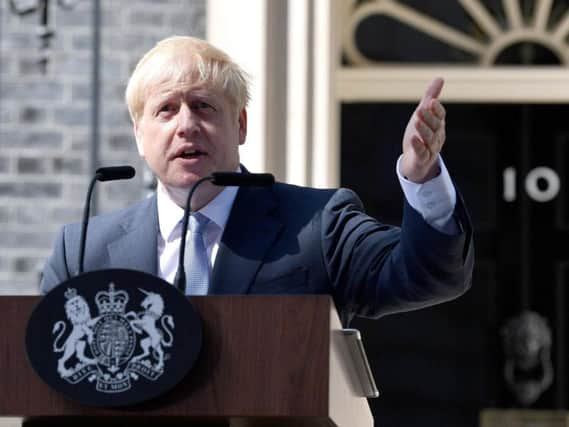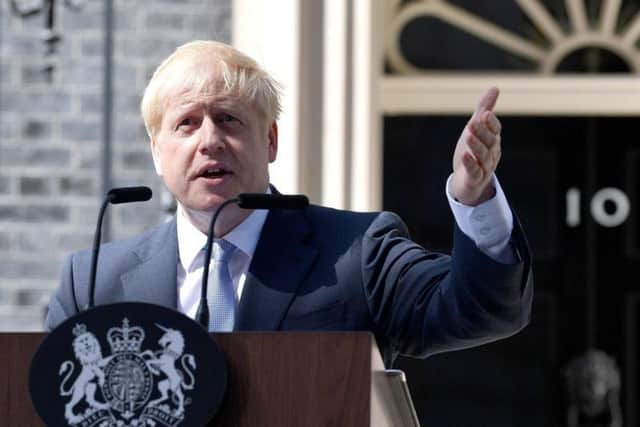'Don't play politics with farming's future,' Boris Johnson told
This article contains affiliate links. We may earn a small commission on items purchased through this article, but that does not affect our editorial judgement.


Advertisement
Hide AdAdvertisement
Hide Ad

Agricultural and rural business leaders have publicly spelt out to Mr Johnson the diligence with which they believe he needs to nurture an industry that underpins the nation’s largest manufacturing sector, food and drink, contributes more than £120bn to the economy and employs almost four million people.
Setting out their priorities, countryside figureheads called on his premiership to deliver stability, a long-term plan for farming, “frictionless” trade with the EU, “proud” promotion of British produce and the protection of British food standards.
Mr Johnson, who was photographed sheep shearing at Wensleydale Longwool sheep breeder Ernie Sherwin’s farm near Bedale during his Conservative leadership campaign, has already promised he will be “aiming to ensure that we have a trade deal that minimises friction on the cross-border transfer of goods, while ensuring that our border is secure and protects UK citizens”.
Advertisement
Hide AdAdvertisement
Hide AdResponding to a letter from Minette Batters, president of the National Farmers’ Union (NFU), last month, he wrote: “The UK farming sector has a number of concerns that I am committed to addressing.”


Following Mr Johnson’s appointment as prime minister this week, Mrs Batters urged him to ensure Britain’s departure from the EU is “smooth and orderly”.
“A deal with the EU is crucial to maintaining free trade with our closest neighbours and largest trading partners, as well as access to people that want to come to the UK to work on farms,” the union leader said.
“We need to see policies that allow farm business to innovate, that help farmers rise to the challenge of tackling climate change, that enable farms access to the workers that pick, pack and grade our fruit, veg and flowers, and crucially an Agriculture Bill that is fit for purpose for the rising challenges of food production.”
Advertisement
Hide AdAdvertisement
Hide AdAccording to Tim Breitmeyer, president of the Country Land and Business Association, Mr Johnson’s “rhetoric of no-deal must not be allowed to become the political default option”.
He went on to say: “In the long term it will be possible for rural businesses to adapt to the changing political landscape, just as they always have done. But for the immediate future, the uncertainty is deeply concerning and brings in to sharp focus the need for a long-term funding settlement to replace the Common Agricultural Policy. This would provide much-needed reassurance for farmers in uncertain times.
“The UK has a growing global reputation for its food production. In any future trade discussions our high standards must not be up for negotiation. Quite the opposite. They are our biggest selling point, and the Government must fly the flag for British produce loudly and proudly.”
Phil Stocker, chief executive of the National Sheep Association (NSA), called on Mr Johnson not to play “populist politics” as he sets out his Brexit plan.
Advertisement
Hide AdAdvertisement
Hide Ad“This is not a time for playing politics or making rash promises in an attempt to demonstrate perceived leadership strength. Britain needs stability and a framework that avoids business disruption, with serious consideration of sectors like the sheep industry that we know are particularly vulnerable,” Mr Stocker said.
“The picture is bleak for British sheep farming if Mr Johnson refuses to avoid a hard or disorderly departure from the EU, something we know would result in major trade disruption with inadequate time to put in place alternative options.”
The NSA said it had been calling for a proper no-deal contingency plan for the sector to be put in place for some time, but that it was picking up its urgency in doing so due to Mr Johnson’s apparent willingness for a no-deal Brexit.
Mr Stocker added: “Leaving without a deal and ending up with a WTO (World Trade Organisation) Brexit will cripple our trade. We currently export some 35 per cent of our sheepmeat, with around 96 per cent of that going to EU markets.
Advertisement
Hide AdAdvertisement
Hide Ad“To suddenly add a tariff of 40 to 50 per cent of value will make trade to the EU unworkable without severe price collapses that the industry cannot carry.
“Promises of a rescue package once things have gone wrong are the wrong approach – what is needed is a strategic package of measures to avoid collapse in the first place. I urge Mr Johnson to prioritise an orderly Brexit that gives continuity with trade, and the formation of a clear strategic plan that negates any breakdown of Britain’s sheep farming industry.”